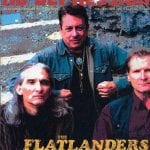Lisa Mednick – Atypically Texan
Calling Lisa Mednick a “Texas singer-songwriter” is kind of like buying a pair of shoes through the mail: The item fits the description, technically, but the comfort level is minimal. Mednick calls Austin her home, after long tenures in New York City and New Orleans. And she does write songs, as the credits on her new album, Semaphore, attest.
But fitting her into the mold of the Lone Star singer-songwriter, as it is popularly envisioned, does a disservice both to her and to the category. As opposed to the guitar, the songwriter’s default instrument, Mednick plays keyboards, accordion, saxophone, and drums. And stylistically there are only traces of blues, country and folk — the traditional arrows in the region’s musical quiver — in her music.
But Mednick is used to cutting into music scenes at oblique angles. She never really fit as a punk in New York, either (“I wrote pop songs anyway, no matter what I thought I was doing,” she recalls). Her musical sensibilities have emerged, seemingly, in spite of her surroundings.
The gestation has been protracted and sometimes painful. Mednick’s first solo disc, Artifacts Of Love, was released on the since-defunct Dejadisc label in 1994. Semaphore, its follow-up, is just now seeing the light of day.
There was no crisis of creativity, though. As Mednick tells it, it was all about the Benjamins.
“It took two and a half years to make, due to money or lack thereof,” she says wryly. “I was working a day job the whole time, as a secretary….I had to switch studios three times. When there’s no cash flow, you have to use your paycheck.”
The challenge was to keep the disparate sessions from sounding “like a series of demos,” she says. “I consciously avoid that, I tried to make it sound like it all happened at once.” That discipline and consistency of vision does indeed make Semaphore sound cohesive.
That’s not to say she was musically isolated during its creation. Ever since her arrival in Austin over a decade ago, Mednick has thrown herself into the creative fray. She worked as one-half of an acoustic duo, Ship Of Fools, and played with the Alejandro Escovedo Orchestra. There was a short-lived, though tantalizing, collaboration with Marcia Ball, Rosie Flores, drummer Lisa Pankratz and bassist Sarah Brown in an all-female quintet called Henhouse. Beyond the local realm, she recorded and toured with New Zealand pop band the Chills, and also did several tours as keyboardist with Boston alt-popster Juliana Hatfield.
Before, during and after, she continued to perform on her own. In addition to her 1994 album, she also contributed including a head-turning vocal on Across The Great Divide, an acclaimed collection of songs by Jo Carol Pierce. And she accumulated an impressive list of studio credits on records by fellow Austin songwriters including James McMurtry, Michael Hall and Ray Wylie Hubbard.
“Her songs are just cool and important,” says Hubbard, harkening back to when Mednick guest-starred on his 1999 album Crusades Of The Restless Knights. Mednick and Hubbard co-wrote “After The Harvest” on the album — “an attempt at a mythological bluegrass Buddhist Gnostic gospel hymn,” he jokes. “Lisa and I hit two out of the six.” She played accordion and added vocals to others.
“I really respect her writing,” he continues. “With her, there was a sense of trust that we wouldn’t put out anything out goofy….Whereas with me alone, it’s always a toss of the coin.”
In the movie Songwriter, Kris Kristofferson inquires of Willie Nelson’s character, “Do you deliberately make things complicated just so you can stay interested?” That question might apply to Mednick as well. How else to explain a musical education that includes studying saxophone with Charles Neville and keyboards with jazz pianist John Malachi? Not to mention her stint in Pop Decay, a New York punk band not unfamiliar to the habitues of CBGB and Max’s Kansas City, and a four-year tour of duty with the Song Dogs, a New Orleans pop ensemble.
Her deliberately eclectic resume may account for the wide-ranging pop stylings that inform Semaphore. A song about love’s departure is set to the tune of a Cajun waltz; another, an apocalyptic image of cities burning, moves incongruously to a jaunty garage-band singalong groove (imagine the Roches meeting, say, David Byrne at his most playful). “Wrecker” is a harrowing portrait of a woman scorned (“Follow me to the rocks, I’ll blow you away/I might have been your shelter, but I’ll be your storm today”). And the title track seems to paint an autobiographical portrait, casting the singer as a cool and enigmatic conduit for the characters and emotions that populate the album.
A boyfriend with a yen for Townes Van Zandt helped lure Mednick from the Crescent City to Austin. “I think that I was able to work on my songwriting here in a way I didn’t get to when I lived in New Orleans,” she says in retrospect, though she acknowledges that her time in Louisiana was particularly influential.
“There are certain rhythmic feelings and qualities that tend to be brought out in music, and I really didn’t know how to access those until I got to New Orleans,” she said. “I went there to find my masculine identity with the drums. In the yin and yang of music, the male is the drums and the female is the melody. You have to kind of marry that within yourself. I don’t think I’ll ever finish learning that, but I feel like I get there sometimes.”




